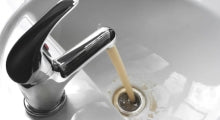Certification
Replacement for Brand
Refrigerator Filters
Regular price
$25.99
Sale price
$25.99
Regular price
Unit price
/
Model WD-UKF8001 Certification NSF 42, 372 Filter capacity 300 gallons (1137 liters) / 6 months...
Regular price
$14.99
Sale price
$14.99
Regular price
Unit price
/
Model WDS-DA2900020B Certification NSF 53, 42, 372 Filter capacity 300 gallons (1137 liters) / 6...
Regular price
$37.99
Sale price
$37.99
Regular price
Unit price
/
Model RPWFE Certification NSF 42, 372 Filter capacity 300 gallons (1137 liters) / 6 months...
Regular price
$18.99
Sale price
$18.99
Regular price
Unit price
/
Model WD-XWF Temperature 33-100 °F / 0.6-38 °C Filter capacity 200 gallons (757 liters) /...
Waterdrop Replacement for LG® LT700P® ADQ36006101 Refrigerator Water Filter and LT120F® Air Filter
NSF 42 & 372 Certified*
Regular price
$29.99
Sale price
$29.99
Regular price
Unit price
/
ModelWD-F32A01 (WD-F32, WD-A01) CertificationNSF 42, 372 Filter capacity200 gallons (757 liters) / 6 months Flow...
Waterdrop Replacement for W10295370A, Everydrop® Filter 1 Refrigerator Water Filter
refrigerator water filter
Regular price
$15.99
Sale price
$15.99
Regular price
Unit price
/
High standard and authoritative certification approves Waterdrop's promise for healthy water. Ideal fit & no...
Waterdrop (Built-in CHIP) Replacement for GE® RPWFE Refrigerator Water Filter, NSF 42 & 372 Certified
refrigerator water filter
Regular price
$36.99
Sale price
$36.99
Regular price
Unit price
/
Model WD-F19C Certification NSF 42, 372 Filter capacity 300 gallons (1137 liters) / 6 months...
Regular price
$32.99
Sale price
$32.99
Regular price
Unit price
/
Model WD-LT1000P Temperature 38-100 °F / 0.6-38 °C Filter capacity 200 gallons (757 liters) /...
Regular price
$15.92
Sale price
$15.92
Regular price
Unit price
/
Model WD-DA2900003G Certification NSF 42, 372 Filter capacity 300 gallons (1137 liters) / 6 months...
Regular price
$22.27
Sale price
$22.27
Regular price
Unit price
/
Model WD-DA2900020B Certification NSF 42, 372 Filter capacity 300 gallons (1137 liters) / 6 months...
Regular price
$31.99
Sale price
$31.99
Regular price
Unit price
/
Model WD-DA97-17376B Temperature 33-100 °F / 0.6-38 °C Filter capacity 316 gallons (1196 liters) /...
Regular price
$17.99
Sale price
$17.99
Regular price
Unit price
/
Model WDP-DA2900020B Certification NSF 401, 53, 42, 372 Filter capacity 300 gallons (1137 liters) /...
FAQs Related to Refrigerator Filters
What contaminants do refrigerator water filters remove?
Common contaminants that many
refrigerator water filters target include Chlorine, Sediments, Herbicides and Pesticides, Heavy
Metals, and Microorganisms.
Have to be aware of is, the specific
contaminants that refrigerator water filters can remove may vary depending on the type and brand
of the filter.
How often should I replace my fridge water filter?
It’s generally advisable to change your refrigerator water
filters every six months to ensure convenient and dependable access to fresh drinking water for
your entire family.
Certain refrigerator models are equipped with warning lights to
signal when it’s time for a filter replacement. Refer to your refrigerator’s brand guidelines to
determine their recommended filter replacement schedule.
Can I use a generic filter instead of a brand name filter?
Yes, you can often use a generic filter instead of a brand name
filter in various applications.
The brand-name refrigerator water filters often come with a
higher price tag. However, this does not mean that universal filters are worse than brand
filters.
The performance of a filter largely depends on the specific
generic filter you choose. Waterdrop offers a wide range of replacement filters for various
refrigerator brands in the market, including Samsung, LG, GE, and Whirlpool.
What’s the difference between a fridge water filter and a regular water filter?
The difference between a fridge water filter and a regular
water filter lies primarily in its design, purpose, and placement.
Water filter for fridge: These filters are specifically
designed to fit into a refrigerator, often integrated into refrigerators with built-in water and
ice dispensers. They’re typically smaller and must conform to the specific design and space
constraints of the refrigerator model.
Regular Water Filters: These can come in various forms, such as
under-sink filters, countertop filters, whole house filtration systems, or faucet-mounted
filters. They are not restricted by the design constraints of a refrigerator and can be larger
or differently shaped.
Both types can ensure a supply of clean and healthy drinking
water. A refrigerator filter allows for the direct dispensing of cold water, catering to the
preferences of those who enjoy chilled beverages. On the other hand, a standard water filter
offers versatility, allowing you to place it anywhere you desire, be it in the living room,
kitchen, or even the bedroom.
Which water filters for fridge brands are compatible with Waterdrop replacement refrigerator filters?
Waterdrop refrigerator replacement filters are compatible with
most major name brands, such as GE, LG, Whirlpool, Samsung & more available.
What is the price range for refrigerator water filters?
The price range for refrigerator water filters typically falls
between $15 to $60
How do I choose the right refrigerator filter for my fridge?
To choose the right refrigerator water filter, consider these
simplified key steps:
1. Identify Your Refrigerator Model: Check your fridge’s user
manual or the identification plate inside for the model number.
2. Understand Filter Requirements: Determine the type (e.g.,
push-in, twist-in) and the size and shape of the filter needed.
3. Check Compatibility: Ensure the selected filter is
compatible with your fridge model.
4. Decide on Filtration Quality: Know what contaminants you
want to remove and check for certifications from independent bodies like NSF International.
5. Installation and Maintenance: Understand how easy it is to
install and maintain the filter, including replacement frequency.
In summary, the right refrigerator water filter choice hinges
on ensuring compatibility with your fridge, meeting your water filtration needs, and offering
good value for money.
Will a water filter for fridge for my refrigerator disinfect the water?
Refrigerator water filters are primarily designed to improve
the taste and quality of water by removing impurities and contaminants. They typically use
activated carbon or other filtration technologies to trap and remove particles and chemicals
from the water. They may not eliminate all types of microorganisms or bacteria that could be
present in the water.
Sort by
- Featured
- Best selling
- Alphabetically, A-Z
- Alphabetically, Z-A
- Price, low to high
- Price, high to low
- Date, old to new
- Date, new to old
Never miss a sale
Subscribe Waterdrop Notifications For The Latest Discount And Updates. You can disable anytime.
Subscribe
Thank you for subscribing!
We are thrilled to have you on board and look forward to sharing exciting updates, exclusive offers, and valuable insights with you.

































































































































